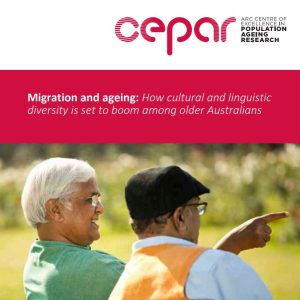Evolving challenges for older migrants [FECCA]
Australia’s population is growing older and more diverse posing issues for the care of people in retirement, according to new population ageing research.
Rafal Chomik, a researcher at the Centre for Excellence in Population Ageing Research, told the recent Federation of Ethnic Communities Councils of Australia (FECCA) conference that rather than language barriers, it would be cultural and financial barriers that could become issues for people in later life.
Mr Chomik presented a paper at the conference titled ‘Migration and ageing: How cultural and linguistic diversity is set to boom among older Australians’.
 The paper says Australia is growing older and more diverse. By the mid-2050s, 1.5 million Australians aged over 65 are expected to have been born in Asia, representing a fifth of the older population. This growth represents a four-fold increase over 20 years.
The paper says Australia is growing older and more diverse. By the mid-2050s, 1.5 million Australians aged over 65 are expected to have been born in Asia, representing a fifth of the older population. This growth represents a four-fold increase over 20 years.
It says that changing migrant profiles mean the share of older Australians speaking English poorly with decline.
“While language becomes less of an issue, cultural challenges – including the cultural appropriateness of services – will become more important,” the paper says.
“Among younger Australians, cultural and linguistic diversity is not a minority issue when family background or ancestry is considered.
“Millennials are the first minority Anglo-Celtic generation since colonisation. Past and future migration is now beginning to dramatically transform the profile of older Australians.
“Australia needs migration to offset demographic ageing. But migrants also age and the rise in cultural and linguistic diversity among older Australians may reveal new vulnerabilities across socioeconomic, psychosocial, health, and care domains.
“Indeed, with declining language barriers, cultural barriers may become more significant. Four key examples noted in this brief relate to the labour market, savings, social engagement, and health.”
The report says better education does not necessarily translate to better employment and income outcomes, indicating the presence of skills mismatches and barriers in the labour market.
“Lower superannuation and financial literacy, as well as a lag in home purchase may spell challenges in retirement for some migrants and CALD community members,” the paper says.
“Lower social participation of people in migrant and CALD communities is associated with isolation and worse mental health; and migrants’ advantages in health and health risk factors converge with the rest of the population, resulting in delayed and lower access to health care and aged care as well as higher disability rates.”
The paper says each of these areas would benefit from policy interventions.
The report recommends “targeting financial literacy and English language training, to improving recognition of international qualifications, requiring employers and service providers to collect CALD data, and tailoring delivery services and educating staff to ensure access across an ageing and more diverse communities”.
Read the paper here: 2024-CEPAR-Research-Brief-Migration-Ageing.pdf












